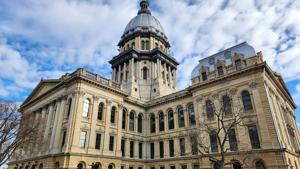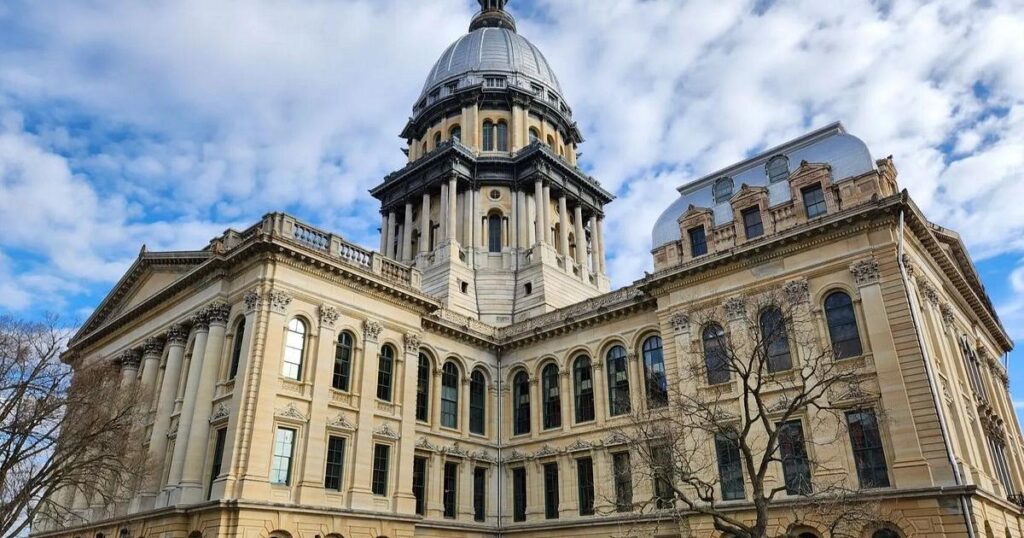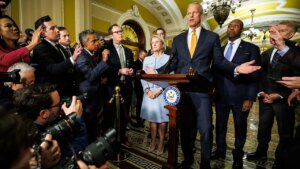
(The Center Square) – Illinois lawmakers are considering progressive revenue measures in the final hours of the fall veto session, but their proposals are drawing questions from both sides of the aisle.
Although some Illinois Democrats have joined progressive groups in calling for new taxes, Gov. J.B. Pritzker says lawmakers have a lot more work to do.
The Illinois Revenue Alliance lobbied for progressive revenue at a press conference in Springfield Wednesday morning.
Rashanah Baldwin of the Workers Center for Racial Justice said it is time for state legislators to act.
“We’re calling on Gov. Pritzker to lead the charge to tax the rich in Illinois, making sure that wealthy corporations and the ultra-rich pay their fair share,” Baldwin said.
Illinois lawmakers are considering progressive revenue measures in the final hours of the fall veto session, but their proposals are drawing questions from both sides of the aisle.
BlueRoomStream
The governor was asked about new tax proposals to fund the transit fiscal cliff put forth by members of the Illinois House when he spoke Wednesday in Taylorville.
“Well I have to say they sprung a whole bunch of things that have never been seen before, and so it’s very hard to evaluate in a short period of time. I think there’s a whole lot of work the legislature still has to do,” Pritzker said.
The governor said a so-called “billionaire’s tax” on unrealized capital gains has never been done before.
The Tax Foundation said the Extremely High Wealth Mark-to-Market Tax Act is “an astonishing proposal” that would impose a 4.95% tax on the unrealized gains of all assets, tangible and intangible, of billionaires.
The Chicago Tribune reported earlier this month that Pritzker and his wife paid $1.6 million in federal taxes and about $500,000 in state income taxes from more than $10 million of income last year. The billionaire governor has also earned millions in capital gains over the last few years.
An Illinois House committee advanced a measure to cut off federal tax incentives for businesses, although a Statehouse Republican urged her colleagues to think about manufacturers in their communities.
Illinois Senate Bill 1911 would take away congressional Republicans’ Big Beautiful Bill provision for businesses to immediately write off investments in manufacturing and production.
Erin Coleman Branchaud, pastor at St. Luke’s Lutheran Church on Chicago’s North Side, pushed for progressive taxation at the Illinois Revenue Alliance press conference.
“As a first step, we need to decouple and undo these giveaways to big corporations and the ultra-rich,” Branchaud said.
State Rep. Amy Elik, R-Alton, urged the Illinois House Revenue and Finance Committee not to decouple from the federal legislation.
Elik said manufacturing benefits are crucial to U.S. Steel’s potential investment in her community.
“I need them to have those immediate tax benefits. I can’t give them five years when other states are giving them immediate tax benefits. Like, it is that desperate. We are desperately trying to save manufacturing in Granite City,” Elik said.
The Alton Republican asked her colleagues to think about medium-sized manufacturers and small businesses in their communities.
“Any time that we take away and make us an outlier, we are absolutely hurting business,” Elik added.
Referring to her notes from a previous meeting, Elik said business incentives add “rocket fuel” to manufacturing.
Will McBride of the Tax Foundation said it would be the right move for Illinois to conform to the federal incentive for investment in manufacturing.
“Illinois is part of the Rust Belt where a lot of these old factories went into disrepair for decades and the industry withered away in many respects. Conforming at the state level to the provision would provide that incentive to revitalize those facilities and build and invest in new ones,” McBride told The Center Square.
McBride said it’s most likely a minority of states that will choose not to conform.
“And they’ll be at a competitive disadvantage. Illinois will lose out to neighboring states, Indiana for instance, that are more likely to conform to many of the provisions,” McBride said.
McBride said the federal law would also allow companies to immediately write off investments in research and development, including salaries for scientists and researchers.





